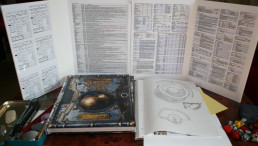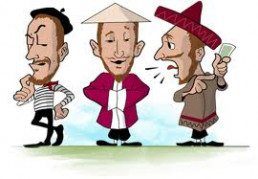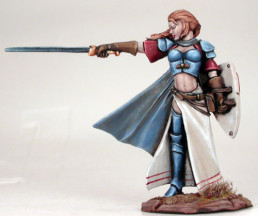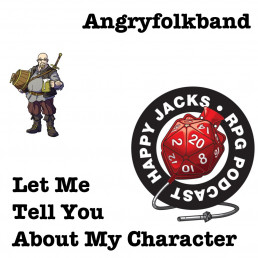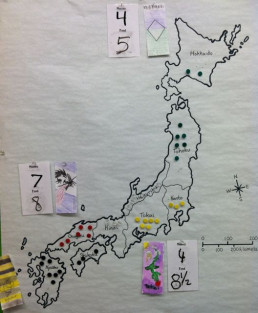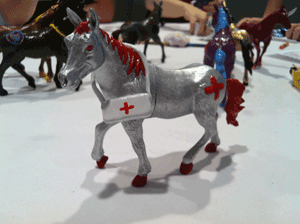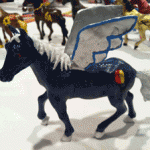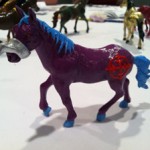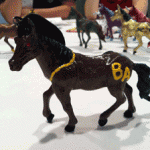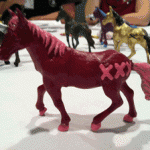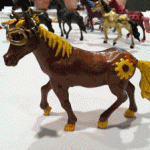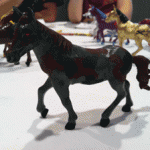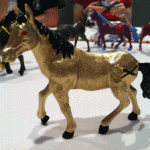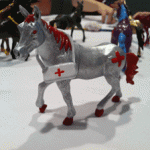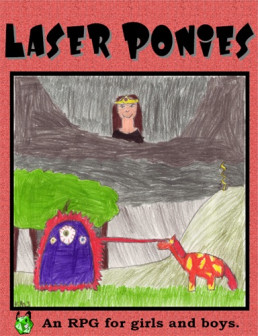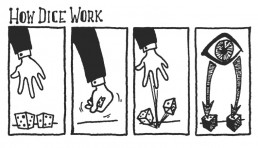Comprehending Cross-Gender Characters
Cross-gender role-playing can be a controversial topic at the gaming table. Opinions are as varied as one could imagine and while some gaming groups are very open to cross-gender characters, other groups are flat out against it. So why is something that has been around since role-playing began such a big deal?
Women are partially to blame. The number of female tabletop gamers has been growing for many years and co-ed games can make people uncomfortable with portraying the opposite sex. After I posed the question on Twitter, one man likened it to faking a British accent with a British person at the table. The pressure to "do it right" can take a lot of the fun out of role-playing, even if the other players at the table aren't judging you. I was very worried about portraying a man "right" the first time I cross-gender role-played, and it showed. It was our third or fourth session before I really hit my stride and stopped second guessing myself before speaking. I've seen the same thing happen with men playing female characters. Social pressure can paralyze a person's creativity and role-playing ability.
Everyone worries about being judged by others, and good communication is the key to insuring that everyone enjoys your game. If you are worried about insulting a person in your game by portraying the opposite sex, warn them ahead of time. Please notice, I didn't say to ask permission, because only the GM should have the power to veto a character concept. Just give the other player a heads up, and if it's your first time playing a cross-gender character, maybe ask for some tips. In my experience, it doesn't matter if you screw up from time to time. If it's obvious you are really trying to create a cool character most people will be very supportive.
Sadly, there are those people who seem to play cross-gender characters just to make other players uncomfortable. I have seen this happen with players of both genders, but I think it's more common for women to be upset in this way. Usually, this happens when you are in a gaming group of people that you don't know well. Now, really insulting a normal, reasonable gamer is harder than you'd think. Playing an unintelligent woman who loves shoes isn't necessarily insulting to women (or original), but playing an unintelligent woman who trades sexual favors for shoes every time the party stops in town is something else. The difference is that the player is taking a specific action to demean the character in a way that relates to their gender. As a woman, I can forgive someone for playing a little bit of a stereotype. I cannot ignore someone treating a female character as a sausage wallet to satisfy their own sexual or misogynistic fantasies.
If you are uncomfortable in a game talk about it. Ninety-seven percent of gamers are great people who are not setting out to insult you. Usually if you can have a calm conversation they will try to fix things in future games. If you are not comfortable speaking directly to the other player or if the other player doesn't agree with you, speak with your GM. You are as important as any other player at the table and if someone's role-playing is making you uncomfortable, it's important that the situation is fixed. Be logical, non-judgmental, calm, and have the first conversation in private. Nobody likes to have their mistakes pointed out in front of their friends, so having the approaching them in private increases your chances of really being heard. Also, take action immediately when something unacceptable happens at the table. Get in touch with the player or GM after the session or when your group takes a dinner break. If you say nothing, you are setting the precedent that things of that nature are acceptable. It's sad that some boundaries need to be pointed out, but to be perfectly honest, some gamers need help with social cues and understanding that some actions aren't ok, even if they fit with their idea of a character. (Sheesh, there I go stereotyping...)
What is the most important thing to remember about playing with cross-gender players? Relax. Don't try to psychoanalyze them. It doesn't mean that they are homosexual, have penis/vagina envy, mommy issues, need to get laid, or anything else. Most players just try it as a change of pace or for a new challenge. If you aren't interested in playing a cross-gender character, fine, but be open minded with those who want to try it. The purpose of gaming is to enjoy ourselves. Some of us do that by playing characters very similar to our real selves, some of us love to try out completely different personalities for a few hours. Whatever your preference, the purpose is for everyone to have fun! It is a game after all.
(This article was originally posted on CharismaBonus.com)
Jumping into GMing

GameMASTER. The title itself has a way of excluding about half the population, and that fact is reflected in every game shop and on every convention floor. The number of female gamers may be rising, but the number of female GMs is still pathetically low by comparison. This has to change if we are going to continue to grow as a demographic.
GMing is something that every gamer should do at least once. It's an incredibly educational experience, and even if it doesn't end up being something that you stick with, you will be a better gamer for giving it a try. I was terrified the first time I ran a game, and consequently over prepped my game. It was a 4e game, based in a fantasy ocean world that I created called Nenesto. I had such a blast coming up with the NPCs, the cultures, and the challenges! I completely fell in love with the creative process and the power... THE POWER!! MWAHAHA... ahem. To date, I have run more than twice as many convention games as I have played in. Once the GMing bug bites, it doesn't let go, girls!
I have never run an adventure path or company published scenario for a group of players. I know that a lot of GMs start this way, and it can be very enjoyable. I've had a blast playing in many published campaigns, but I find that it is harder to run a game like that than just create my own world. No, I'm not crazy. Actually, I would argue that it would be easier for most people once they got over their fear of trying. Think back to when you were a kid. You had to study and practice the information that people gave you to learn, but you always could remember the smallest details about the stories, games, and worlds that you dreamed up yourself. It's much the same with self-created gaming worlds. I created the details of the world, so it's harder to forget them or mess them up... and if for some reason I do mess up, it's really easy for me to change to world to accommodate my mistake.
But how does one start to attempt such a daunting task as creating a game from scratch? First, you need to find a group of (kind) players. I was lucky enough to already have a gaming group that encouraged me to try GMing, but if you aren't so lucky, try recruiting friends and family members. Even if you end up running a game for two people who aren't gamers, it will be great practice and break the ice for you. Actually, running your first game for non-gamers has it's advantages. They are less likely to notice your mistakes, and you get a lot of practice explaining the system mechanics to them. I do not recommend running your first game for a group of strangers at a gaming store or convention, because you never know what type of players you will get.

After you have your players, pick your system. It should be a system that you are pretty familiar with, ideally one that you have played a lot. I recommend this because the more you know about the mechanics of a system, the easier it will be to tailor a good story around it and keep your game running smoothly. Have most of the basic combat and skill stuff memorized or on cheat sheets so you don't waste your players' game time looking stuff up. Cheat sheets are your friend! I'm convinced that's why the GM screen was originally invented. Another great trick is to have more obscure combat rules other important information marked so you can easily find it. Your mind will go blank at some point and it's great to be able to quickly find that info. My Wild Talents book is covered in multicolored sticky tabs for this very reason. Your players will appreciate your efficiency and be impressed that you are so prepared. Make no mistake, they will always do the one thing that you can't remember the mechanic for... darn players!
Step three, create your world based on something you know and love. Most likely the system you picked has errata with details about races, monsters, kingdoms/cities, etc. Feel free to use it or lose it. Don't feel that because you are running a DnD game that you HAVE to have dwarves, elves, and all the usual DnD suspects. Maybe your world only has humans, or maybe it takes place completely underground in the dwarven cities. It is YOUR world. Also, don't be afraid to go in a completely different direction than the game designers intended. One of the most successful games I have ever run was a Wild Talents game (a superhero system) about the Salem Witch Trials. The poor puritans started developing powers and panicked because they assumed it was the devil's work. What made it so great? I picked something I knew well and was passionate about. I'm a history teacher by day, and my love for the setting made the players equally passionate. You know your game is a success when they are standing up in the middle of a convention room yelling at each other completely in  character, and completely oblivious to the other games around them. It's those moments that I live for as a GM. Do you know everything about Tolkien's elves? Are you a huge Firefly fan? Could you write encyclopedias about vampires in your sleep? Those will be your most successful games. (This also comes in handy when you have a really knowledgeable player! One of my players for the Salem game had recently taken a class on the Witch Trials, so it was a good thing I knew my stuff!)
character, and completely oblivious to the other games around them. It's those moments that I live for as a GM. Do you know everything about Tolkien's elves? Are you a huge Firefly fan? Could you write encyclopedias about vampires in your sleep? Those will be your most successful games. (This also comes in handy when you have a really knowledgeable player! One of my players for the Salem game had recently taken a class on the Witch Trials, so it was a good thing I knew my stuff!)
After you have your system and your world imagined, start refining it into a (somewhat) linear plot. Just like writing stories, start with a basic outline and then slowly add in the details. For your first time, stick to a one-shot game that can be completed in four to six hours. Remember, the world that you created can be used again and again so all that prep isn't a waste for one game. Your adventuring party might save a specific kingdom from a demon, but there are many more kingdoms for them (or other players) to explore! Don't feel like you have to cram all of your creative material into one game. Keep it secret, keep it safe, then use it later.
I will be providing more helpful advice on GMing specific types of games in future posts, but the first step is always the hardest. Don't be afraid to "borrow" ideas from your favorite source material and realize that you will make mistakes, and that is ok! Be secure in the knowledge that EVERY GM screws up sometimes, and jump in with both feet.
(This article was originally posted on CharismaBonus.com)
Acquiring Accents for RPGs
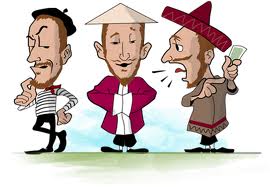 Accents are one of the most powerful tools in a role-player's arsenal. Using them can make characters stand out at the gaming table, and differentiate between in character and out of character comments. They can also be the difference between a good GM and an incredible GM who truly immerses players in their world. Why narrate a story? Bring out your inner thespian and BECOME your story.
Accents are one of the most powerful tools in a role-player's arsenal. Using them can make characters stand out at the gaming table, and differentiate between in character and out of character comments. They can also be the difference between a good GM and an incredible GM who truly immerses players in their world. Why narrate a story? Bring out your inner thespian and BECOME your story.
First of all, research whatever accent you'd like to try, or shop around for an accent that you can mimic fairly well. One of the best tools for listening to accents is the internet, specifically videos. Search for "regional dialect meme" on Youtube and you will get a ton of options from all over the world. This meme is particularly helpful because it includes many words and sounds, but it also includes regional terms. For example, is it "soda" or "pop"? These terms can be awesome little details to add to your characters and really unify a group of characters that are from the same place.
Remember, it's ok if you aren't perfect at first, and you really will get better as you go. Hell, it's an RPG! Unless you are playing a historical game, who's to say your accent isn't perfect? Maybe the people from that land over the mountains sound exactly like your bad Jamaican accent. There are a large number of Russian/Irish accented characters in my games... who start to sound more Irish as I drink. Go fig.

Accents are regional, not racial. In a recent season of the Happy Jack's RPG Podcast, another host started speaking like a southern character from one of our games. The character was named Windy Drawers, and he was a sloppy, overeating, unintelligent politician. We instantly started receiving angry emails from people who were upset that we were depicting such an unflattering African American stereotype on our show, however we had never mentioned Windy Drawers' race on that episode of the podcast. In our game he was actually a rich southern white man, but listeners drew their own conclusions based on their own racial stereotypes. Let me say it again, accents are regional, not racial. They are determined by where you grew up and lived, not by your ethnicity or species.
This is a very important distinction that is often overlooked in gaming... and in the media. The stereotypical dwarf may have a Scottish accent, but if he was raised by elves (oh, the horror!) he will sound more like an elf than his dwarf kinsmen. Humans from different parts of the world should have different accents, and drow should not sound like surface elves... unless they were raised together! A good player or GM will use this in their games. An NPC shows up claiming to be from a local town, but speaks differently than everyone there... clue #1 for the party. Maybe it's your half-elf's first adventure with this band and you're getting to know them along the way? Your Irish/British/Russian/common accent tells them that you were raised by the human side of the family, not the elves. They add depth and complexity to a character instantly, that could only otherwise come from sharing written back stories or long in-game explanations.
Here are some easy tips for mastering an accent:
- Find a phrase that will immediately bring you back into your accent. Usually, this is something very stereotypical that you almost can't imagine being said in any other accent. For my Irish accent I use the phrase "Jesus, Mary, and Joseph!" because it's VERY Irish, and it's easy to fit into many different situations. It's like hitting the refresh button on my Irish lilt.
- Listen to your chosen accent as much as possible. Watch Braveheart 4 more times, or whatever movie has the accent you are trying to mimic. Audio books are also a great option since they are easy to get and reasonably priced. The more you hear the accent the easier it will be for you to imagine it in your head later when you are trying to use it.
- Practice! The more you use your accent, the better it will sound. Talk along with your favorite movie character with that accent, repeat commercials on the radio or read street signs while you're driving in the car. I practice in the car a lot because nobody can hear how awful I sound.
- Anticipate what words you are going to use a lot in the campaign and practice them extra! For example, if you are a German spy in a pulp game, you might be dealing with lots of military equipment, location names, etc. You will probably never have to use the words "elf", "dwarf", or "dragon", so stick to what you'll need. Bonus points for learning and using regional terms or words from their native language!
- Did I mention that you should practice? Seriously, do it. You don't want your first try at an accent to be while you're sitting at the gaming table. Trust me on this, I learned this the hard way.
Farewell to Fear... or Fun?
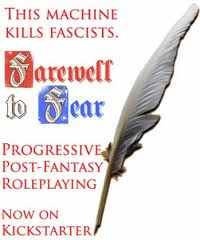 Many people love to complain about what is wrong with the world, but do little or nothing about it. That is not the case with David Hill Jr. of Machine Age Productions. He didn't like the accepted norms of the average fantasy RPG's setting, so he created a completely new RPG system. His new game, called "Farewell to Fear", has raised over $16,000 on Kickstarter, and focuses on bringing political correctness to the RPG fantasy genre. David claims his game is a "Progressive Post-Fantasy RPG". What does he mean by that? Well according to his Kickstarter page:
Many people love to complain about what is wrong with the world, but do little or nothing about it. That is not the case with David Hill Jr. of Machine Age Productions. He didn't like the accepted norms of the average fantasy RPG's setting, so he created a completely new RPG system. His new game, called "Farewell to Fear", has raised over $16,000 on Kickstarter, and focuses on bringing political correctness to the RPG fantasy genre. David claims his game is a "Progressive Post-Fantasy RPG". What does he mean by that? Well according to his Kickstarter page:
Fantasy’s full of all sorts of legacy concepts that are rather disgusting to us; sexism, classism, racism, institutional violence, those are just a few choice items. Farewell to Fear is a game about revolution, about taking fantasy out of the dark ages through drive and action.
Think punk rock meets fantasy. Bad Religion meets Tolkien, boot to face.
Don't get me started on that last comment. It shows a total lack of knowledge of Tolkien's work or its revolutionary impact on the fantasy genre.
Although the information I can find is rather ambiguous, it seems like the focus of this game will be for players to portray normal people, fighting against political incorrectness and unfairness. I applaud Mr. Hill for spending so much time creating a game that embodies so many of his personal beliefs, but despite my love of new tabletop systems, I don't think I want to play his game.
 Why? Because it sounds like every other fantasy game out there, only with more limitations on plot, overall creativity, and roleplaying. The entire concept of this system is that the PCs fight against "the man", who we assume is to blame for the sexism, racism, etc. Already that drastically limits the creativity of the GM to create plots because they have to be about social justice. It also drastically limits the types of characters that the players can create because the PCs have to have the desire to fight the wrongs in society, but not be afraid to rebel against the current institutions that are in place. Party conflict and drama is going to be pretty hard to drum up in a group of incredibly similar characters. Maybe they can't agree on whether to fight racism or sexism today?
Why? Because it sounds like every other fantasy game out there, only with more limitations on plot, overall creativity, and roleplaying. The entire concept of this system is that the PCs fight against "the man", who we assume is to blame for the sexism, racism, etc. Already that drastically limits the creativity of the GM to create plots because they have to be about social justice. It also drastically limits the types of characters that the players can create because the PCs have to have the desire to fight the wrongs in society, but not be afraid to rebel against the current institutions that are in place. Party conflict and drama is going to be pretty hard to drum up in a group of incredibly similar characters. Maybe they can't agree on whether to fight racism or sexism today?
It seems like the whole "Farewell to Fear" concept would be better suited to be published as an adventure path, rather then a game unto itself. They claim that the scientific method is the inspiration for their main mechanic.
The main game system is inspired by the scientific method. Instead of a huge focus on pass/fail mechanics, we’re mostly concerned about finding solutions through conjecture, precedent, and experimentation.
Ok, but how do I hit that guy over there with my sword? The actual dice mechanic spelled out on their Kickstarter page is rather vague, but it doesn't sound very revolutionary to me (unless you've never played anything but D&D). Why design a completely new set of mechanics for something that could easily be used as a skin to lay over an existing, proven system? If you want something other than a pass/fail mechanic, check out the ORE system. For that you roll for the speed and quality of your action, and it is very applicable to situations like archeological digs, performing music, or very intense combat. Why reinvent the wheel? And how many times are your players going to want to play with that same wheel if you put it on a track with limited customization?
over an existing, proven system? If you want something other than a pass/fail mechanic, check out the ORE system. For that you roll for the speed and quality of your action, and it is very applicable to situations like archeological digs, performing music, or very intense combat. Why reinvent the wheel? And how many times are your players going to want to play with that same wheel if you put it on a track with limited customization?
As a woman of mixed ethnicity, I've experience my share of discrimination in my life. I am wholeheartedly against any type of discrimination, hatred, or unfair treatment between players at the gaming table. A game that could fight the imbalance at the table but still be fun would be truly revolutionary. This game does not fight the inequality that happens to players, it only lets them fight injustices that happen in an imaginary Medieval Europe-based world, which is possible in almost any RPG if the GM wants the story to go that way. In fact, it reminds me of quite a few GM created games that I've played in (and created) for D&D4e, Wild Talents, Traveller, and other systems. (This project's Kickstarter video also claims that peasants in the middle ages studied laws to better their situations, and that women held more power than men... as a Medieval history teacher, I'd love to see their sources for that info...)
 My big question? If you are trying to break the traditional RPG mold, why would you choose the most stereotypical setting possible as a foundation? Mr. Hill claims to be improving on the traditional Tolkien fantasy model (sorry... I can't just let that slide) but it sounds like he wants players to behave just like Sam and Frodo. They are normal folk, facing the evils of this world to protect their village's freedom. Or just like Gandalf, who despite being a virtual demi-god, puts the future of Arda in the hands of a minority group (hobbits). Maybe Mr. Hill has forgotten these small plot points, or how Gimli and Legolas broke down the barriers of hatred between their two races and became lifelong friends? Or Eowyn, a noblewoman who successfully kills the Lord of the Nazgul!?!?! I told you not to get me started...
My big question? If you are trying to break the traditional RPG mold, why would you choose the most stereotypical setting possible as a foundation? Mr. Hill claims to be improving on the traditional Tolkien fantasy model (sorry... I can't just let that slide) but it sounds like he wants players to behave just like Sam and Frodo. They are normal folk, facing the evils of this world to protect their village's freedom. Or just like Gandalf, who despite being a virtual demi-god, puts the future of Arda in the hands of a minority group (hobbits). Maybe Mr. Hill has forgotten these small plot points, or how Gimli and Legolas broke down the barriers of hatred between their two races and became lifelong friends? Or Eowyn, a noblewoman who successfully kills the Lord of the Nazgul!?!?! I told you not to get me started...
I wish "Farewell to Fear" the best, but given the current information, I see very little that is truly original in this project.
Thou Shalt Not Play with Assholes
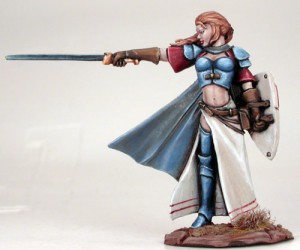 Should subjective tabletop RPG rules be eliminated since they can allow the GM's biases to influence the game?
Should subjective tabletop RPG rules be eliminated since they can allow the GM's biases to influence the game?
This rather hot topic has arisen lately, especially regarding mechanics where the GM can reward players for their role-playing. This discussion was started by site called Gaming for Women and we recently discussed it on an episode of the Happy Jack's RPG podcast.
While misogynistic behavior was the main concern of the article, any time you allow the human element into activities it opens the door for prejudice. I will be the first to admit that this can lead to horrible situations in games and in gaming groups. However, I argue that this subjectivity is imperative to gaming and especially vital with reward mechanics. The human element is the reason we play tabletop games. Otherwise, we'd all just go play video games since they are available whenever we want and don't drink all the beer when they come over. I have seen reward mechanics bring quiet role-players out of their shell and bring games to a whole new level. If a numbers mechanic regulated the use of rewards, rather than the GM, the same people would always get the bennies! Only the subjective judgement of a GM can evaluate the amount of effort a player is putting into the game.
Some people (read: self-proclaimed feminists) chimed in on my twitter feed and claimed that women may need all subjective rules to be eliminated in order to insure total fairness in all gaming groups. WTF? Seriously? I cannot begin to describe how insulted I was by the idea that women need rules to protect them in RPGs. If you are in a group where you need rules to protect you from a GM's vindictive actions, get the fuck out of there! We play games FOR FUN! If you are playing with people who treat you unfairly based on your gender, race, religion, sexual orientation, beer preference, or anything else, it isn't going to be fun. Nobody should ever stay in any type of relationship (romantic, friendly, gaming, or otherwise) where the only thing protecting them from abuse is rules. Being empowered includes the power to remove yourself from a bad situation. Find another group, or start checking out online gaming options if the pickings are slim in your area.
Remember Kimi's golden rule of gaming: thou shalt not play with assholes!
RPG Inspired Comedy Music
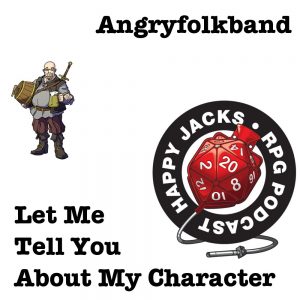
My good friend Stu has put his lyrical genus to use for RPGers everywhere. "Let Me Tell You About My Character" is a collection of five EPs that are all based on situations that are very familiar to every dice-rolling gamer. The songs are written in different styles, including country, rock, Indie electronica (yes, that's a thing), and dance mix. What really makes these songs stand out is the high quality of the mixes and recording. Produced in the Angry Folk Studio, "Let Me Tell You About My Character" lived up to the high sound quality and base humor that have made the Happy Jack's RPG Podcast moderately famous. The songs are $0.99 each and the hilarious lyrics alone are worth twice that. Aren't I generous?
I suggest you buy all the songs, but I have three favorites. "Plan B" is a country song about the intricate plans that RPG players create, and the many ways those plans fall apart. This is track one of the collection and touches on many different games, including Call of Cthulhu and Dungeons and Dragons.
Next on my list is "Storked It". This song is about the traumatizing experience of rolling a critical failure at the vital moment where everything depends on you. This song has GREAT gamer lyrics and mentions lots of different games like GURPS, Savage Worlds, Amber DRPG, and World of Warcraft. Everyone knows how this feels. The term "storked it" was inspired by the Happy Jack's host Stork, the worst dice roller on earth. This song also contains the word "fuck". You shrinking violets have been warned.
The finale and my absolute favorite track in the collection is track five, titled "Laser Printed Hero". This is the theme song of the Happy Jack's RPG Podcast, and this particular recording includes the powerhouse vocals of Heather Greene. They lyrics in this song are the smartest and the most entertaining in this collection. It's based on the incredible lives and adventures of our heroes, who only appear to be printed numbers and words to the unknowing of the real world.
Do yourself a favor and buy these songs. Listen to "Laser Printed Hero" before every RPG you play and you will roll all critical successes. Really...
Middle School History RPG
It is a constant challenge to keep students engaged in middle school. You know the age, spring has sprung and suddenly girls no longer have cooties. In fact, they are darn attractive. Suddenly, school is the last thing on your mind when you are sitting in class. It's Mother Nature herself that I am fighting against each day when I try to keep my 7th graders interested. What weapon can a teacher use in this battle against hormones?
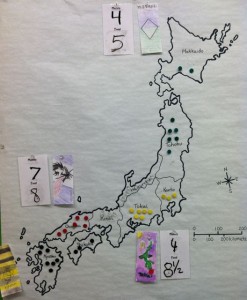
Dice of course! Don't tell me you are surprised...
I've designed a class RPG/Risk inspired simulation to bring Medieval Japan to life in my classroom. Each group of students is responsible for maintaining their feudal state, including the earning of food and money to upkeep their armies. They can declare war and battle against other feudal states, and face the twists and turns that fate can bring upon any civilization. Once my students figured out they could conquer and become the feudal Lords of Japan, their hormones didn't stand a chance. Score one for gaming!
It started with a map. I did research and created battle maps that showed the actual feudal boundaries in Medieval Japan. I then broke my class into 4 small groups and each group was given a feudal state. They created a "nobori" (Japanese for banner) and a symbol to represent their state. I was really impressed by their banners, and they are showing so much team spirit and loyalty to their own states.

Each state started with 3 armies, 2 food, and 1 money, which are marked on the battle map with notes and push-pins for the armies. Each day, they can earn more armies, food, and money by completing their assignments. They need to maintain a minimum level of money for their armies to continue fighting. They also must have 1 food for every 2 armies each day, or their armies start starving to death. The students can trade amongst themselves for food, money, or armies. They can also attack other feudal states, and if they win a war they get to take over the armies, food, and money of the other state. They also take all the students from the conquered group and become one larger group, so nobody gets left out if their group loses a war.
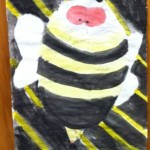
Wars are where the dice come in. For every push-pin army a group has, they get to roll 1d6. I thought this was a fair way to resolve battles. A group with 5 armies is still capable of defending themselves against a group with 7 armies, but the odds are not in their favor. They can have one battle a day, and a group must win 3 battles in order to win a war. If a group runs out of money during a war, their armies go on strike and they are left defenseless. If they run out of food, their armies will die and be pulled off the battle map. Groups that lose a war are absorbed into the victorious group and get to continue participating in this new larger group. Eventually, one feudal state may conquer all of Japan... but maybe not!
But as always, fate plays a hand in the success or failure of nations. This is represented by the Wheel of Fate in my classroom. The groups spin the wheel each day, and luck decides if something beneficial or detrimental happens. Examples:
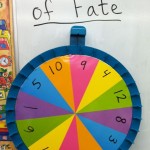
- Extra rain falls in your feudal state. +2 food
- Bandits attack local farming villages. - 2 food
- Your Lords give you gifts for a holiday. +1 money
- You give an inspirational speech to your troops. +2 armies
- Your armies need new armor. -1 money for each army
This seems to be the biggest piece of excitement each day. The students all hold their breaths when their state spins the wheel. It is a game changing event each day. As with real life (and RPGs), a well placed famine or flood can cause real damage to an otherwise successful civilization.
So far, this has been a very successful experiment with my students. It has really increased their interest in history. It's also increased their interest in math as they figure out their chances of success for winning a war, and make long term plans to sustain their armies during their campaigns. We will see if it lures any students into the RPG hobby.
OrcCon 2012 - Laser Ponies Game for Adults
I didn't know what to expect when I ran my adult-theme Laser Ponies convention game at OrcCon 2012. Convention games are an unpredictable beast. You never know who will show up at your table, or if they will buy the concept that you have spent endless hours prepping. This concept was especially risky with Laser Ponies, but I hoped that anyone who signed up for a twisted game of alien ponies would show up ready for anything.
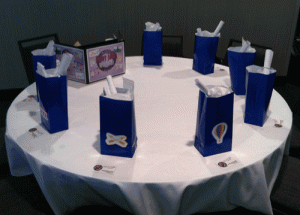
I love having an amazing setup for my players when they arrive. I also like the players to be surprised by the characters that they get. Usually, my players have little clues when they arrive at the table, but nobody gets to see their character sheets until everyone is seated and we get started. For this game, each player had a bag waiting for them that contained their character sheet, a map, a set of My Little Pony stickers (just because they were fun!), and a customized toy version of their character. On each bag was a picture that represented the character inside, and that was their only clue.
The customized ponies were the biggest part of my prep time for this game. Lots of people were very excited because of the crazy description and because we'd been talking about the game on the Happy Jack's RPG podcast for months. EIGHT people were signed up, so I had to make a lot of ponies! They took about two weeks to complete, but I loved the challenge and the creativity involved. I sanded small toy horses that I bought at the Dollar Tree. Then painted each one with spray paint and puffy paint to make them look unique. I was thrilled that the players were so excited to get them.
I was supposed to co-GM this game with my friend Casey, however he fell ill about 10 minutes into the game intro. Things went smoothly and the players bought into the crazy concept that we had created. Basically, the home of the Laser Ponies is being overrun by a drug cartel. The only ponies who can take a stand against this threat are the P-Team. Yes, we ripped off the A-Team, but damn did it make for a funny game. Each character had weaknesses, like uncontrollable lust, war flashbacks, drug addiction, fear of flying, and more. These weaknesses have to be rolled so the players never know when they will kick in. It made for a very adult, but very funny addition to the game.The players got so into it they started rolling their weaknesses, even when I hadn't asked!
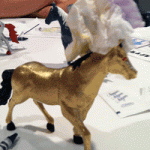
The game went incredibly well, and was one of the most fun games with which I have been involved. The players were what really made it magical. They were incredibly creative and energetic. The started making creative props of their own and kept acting out scenes using their toy horses. The insane plot ideas that they came up with were so unexpected, but it really made the game. Multiple times in our 4 hour game we had to stop because we were all laughing too hard to speak. I feel bad for the other Happy Jacks games that shared the room with us, but holy cow was it fun! The 4 hours flew by, and the game timed out perfectly, ending 10 minutes before the cut off time.
The one thing that I wasn't prepared for was combat. I had planned to co-GM, and Casey is a numbers guy. I had read the rules a few days before, but I couldn't recall the exact damage rules once it was obvious that Casey wasn't coming back. I was subtly trying to look up damage rules while I started the first scene. It didn't impact the game for the players (as far as I could tell!) but it made those first few moments stressful for me. Lesson: Always have the book/PDF with you (huzzah! I did that!) and always read the combat rules before the players show up if its a new system to you.
This was a REALLY amazing game. REALLY. I won't be sharing any plot points here since I may have to run this game again. I might have to retire from adult Laser Ponies forever though, because I doubt any game could live up to the original P-Team.
Laser Ponies Review - Gateway Game for Girls?
"Feel the Pony Power! On a faraway magical world, in the heart of Glitter Valley, there lives a tribe of beautiful creatures known as the Laser Ponies." - Hex Games Website
Hex games created this very simple RPG in 2009. Laser Ponies is aimed at very young players, but it is still a pen and paper RPG that requires basic math skills and reading ability. I'd suggest it for ages 7 and up. I happen to be running an X-rated convention game for adults, but that is just because I'm very broken. Using the NORMAL setting for Laser Ponies makes for a fun, family-friendly, imaginative gaming experience.
Cost – 10/5
Yes, Laser Ponies gets a 10 out of 5 for cost. How is that possible? The PDF costs $1.99... YES, ONE DOLLAR AND NINETY-NINE CENTS! You get a complete RPG game for less than a cup of coffee at the trendy, overpriced location of your choice. Your dice cost more than this whole RPG.
You can buy the PDF at DriveThru RPG and you get all the information you need to run a Laser Ponies game from the single book. The Quick Start rules are in the back of the book and give you an easy run-down of character creation and combat.
Setting – 4/5
As a female gamer, I am thrilled that this game exists. I think it's a great gateway RPG (drug) for kids, ESPECIALLY HORSE-CRAZY LITTLE GIRLS! I would have loved playing this RPG between my weekly riding lessons. I am (correctly) stereotyping girls, but I think games like this one are the way to increase the number of females gamers. Get 'em into the hobby while they're young! Boys are sure to enjoy this system too because there are monsters, bears, and friggin' laser beams!!
The premise is really simple and sweet. Very sweet. It will give any adult cavities. It's a great game for kids though and harkens back to the simpler times of Candy Land... but with lasers. The ponies live in a magical world called Panagonia. Their homes are in Glitter Valley, which is a peaceful but surrounded by scary forests and some mountains. The bears and monsters are the enemies of the ponies, while the beavers and badgers are their allies. The only human is the evil Chasm Queen who is basically the big boss the ponies need to take down.
Again, it's a game for kids. I've had a lot of fun twisting it to my dark purposes for my adult convention game, but it really is a cute setting for kids.
Note: The game even comes with tables of story ideas, so young GMs can have some helpful ideas of where to take their game. What a great idea!
Character Creation – (5/5 Customization) (4/5 Ease)
Character creation is very simple, and the Quick-start guide in the back of the Laser Ponies book can easily take you through the process. It only takes about 5 minutes to roll up a character, and even less if you are an adult. It's really simple. I do suggest that you help kids during character creation, simply to because the reading level of the directions might be a little high for the average 7-year-old... Sorry! Your kid is not average! I get it! They are the next Einstein... help them the first time through anyway.

There is a high level of customization available in this game through the use of "gimmicks". You can give your pony any perks you want, magical or mundane. The book gives amazing speed, invisibility, prophetic dreams, lucky, and many other examples of good gimmicks. The higher your gimmick level, the more likely that you will succeed in your roll. However, your gimmick level is equal to your weakness level. Weaknesses have to be something that majorly impacts the character, such as bad aim, unpopular, phobias, smelly, etc. Your pony might have incredible powers, but they are no good to him/her if nobody will get within 100 yards of them because they have a habit of sleeping in their own manure. The more powerful the gimmick, the more powerful the weakness.
These gimmicks and weaknesses are approved by the GM to insure they aren't going to ruin the adventure. It's really fun coming up with ideas for these and I can picture kids having a blast during the character creation phase. Plus, you get to name and design your pony!!! Mine may or may not have been named Sugar Cube and had little Pegasus wings...
Combat – (5/5 Speed) (4/5 Ease) (5/5 Fun)
Combat is very fast and simple and reminds me of Wild Talents in many ways. It's split into rounds, but there is no specific amount of in-game time in a round. The GM makes the call if something really complicated takes multiple rounds. The GM goes around the table and each player declares their action, then the GM has everyone roll in the order that makes the most sense depending on the actions. It's a d20 system, if the player rolls less than or equal to the characters number, the action succeeds. There are exceptions and specific circumstances where the rules get a little more complicated, but not much. It's very quick and can be very fun since players get to imagine their own attacks instead of using preset attacks from a book.

I gave Laser Ponies a 4 out of 5 for ease because kids will need some help reading and understanding the directions. It's very simple and kids will catch on very quickly. I highly suggest teaching them in-game instead of reading through the rules with them and trying to make them understand from the text alone.
From the pony's mouth...
You may think my scores are very forgiving, and you are right. No, I would not choose to play Laser Ponies over Wild Talents or other systems aimed at adults... unless I wanted to have a game night with my god-daughter Allegra. Laser Ponies is perfectly tailored to its chosen demographic. I highly encourage my fellow nerds to pick up a copy to share with their young kids. It's well worth the $1.99, even if you only play it once. It might turn your Bratz-doll-loving daughter into a tabletop gamer.
If you'd like to try the Laser Ponies system with a more adult setting, I suggest you pick up the Q.A.G.S. (Quick Ass Game System) book. It is the basic system that Laser Ponies is built around, but is much more in-depth. I bought and flipped through the QAGS book and was really amused by it's writing and illustrations, but I haven't studied it at length. It is available from DriveThru RPG for $7.99 and includes more detailed options for point-based characters and advanced player combat.
Laser Ponies RPG
For the next Strategicon gaming convention, my friend Casey and I decided to run a game called Laser Ponies. No, I'm not kidding. It's an actual RPG game that you can buy. It was mentioned in the first season of the Happy Jack's RPG podcast (which I often host) and has been a running joke since then. We thought it was a great idea to design and run an X-rated Laser Ponies game.
What can I say? We were very, very drunk at the time. Never promise to GM a crazy game on-air during a live podcast when you are inebriated. Trust me.
I don't want to give too much of the story away, but I did want to comment on the PDFs we bought to run this game. We bought the Laser Ponies PDF and the QAGS System PDF from Drivethru RPG. The Laser Ponies book is less than $2 right now, and you can actually run the game entirely from this book. You will also be able to enjoy the amazing artwork that comes with this book...

Stop laughing! I'm not kidding! It is really a system book!
The QAGS (or Quick Ass Game System) book is one of the most entertaining system books I have ever read. I know that isn't the hardest thing to do, but it is very funny at times. It starts with the very basics and moves on from there.
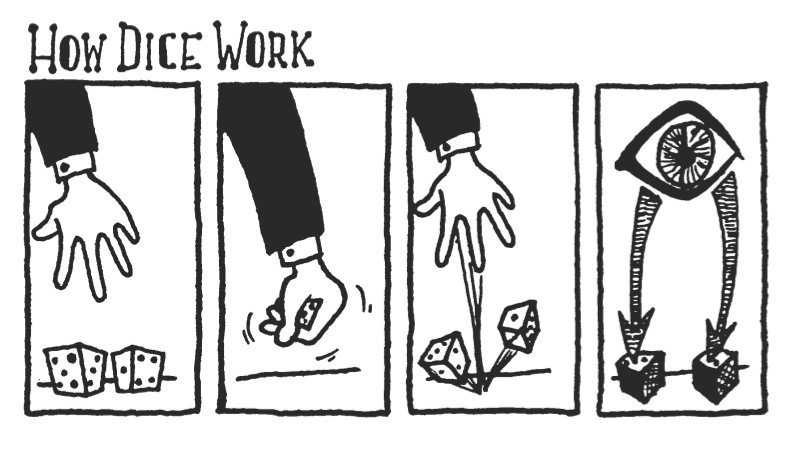 Actual image from the QAGS Book
Actual image from the QAGS Book
The system is pretty simple and can work for any setting. I haven't play tested our game yet, so I will hold off on my review until I've run something with it. However, I will say that for under $10 you can get both of these PDFs, get drunk, and have a lot of fun coming up with insane ideas for the most warped Pony-verse ever.

